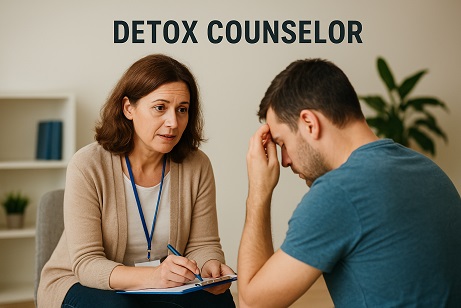Stories you may like
Detox Counselor
A detox counselor supports individuals going through the detoxification process – usually as the first step in overcoming substance use disorders. The detox process can be physically painful and emotionally overwhelming; and without proper support, many people may give up or relapse. Detox counselors help clients manage the physical, emotional, and psychological challenges of withdrawing from drugs or alcohol in a safe, supportive environment.
Duties and Responsibilities
The overriding goal of the detox counselor is to create an environment that encourages stability and readiness for long-term recovery. Here’s a look at what these counselors do on a day-to-day basis:
- Provide Emotional Support – Help clients manage anxiety, fear, and emotional distress during detox. Offer encouragement and motivation to stay committed to recovery.
- Conduct Initial Assessments – Evaluate clients’ substance use history, mental health status, and readiness for treatment. Identify potential risks or co-occurring disorders.
- Monitor Client Behavior – Observe for signs of withdrawal complications, emotional instability, or relapse risk. Communicate with medical staff about any concerns.
- Develop Treatment Plans – Create personalized short-term plans to support clients through detox. Adjust plans based on progress and individual needs.
- Provide Crisis Intervention – Respond to emotional or psychological crises in a calm, supportive manner. Use de-escalation techniques when necessary.
- Facilitate Individual and Group Counseling – Lead sessions focused on coping skills, addiction education, and emotional processing. Encourage peer support and sharing.
- Educate Clients about Detox and Recovery – Explain the detox process, withdrawal symptoms, and importance of follow-up care. Teach healthy coping mechanisms and stress management techniques.
- Coordinate Referrals to Ongoing Treatment – Help transition clients to inpatient rehab, outpatient programs, or therapy. Connect clients with support services like housing, employment, or healthcare.
- Maintain Accurate Records – Document client progress, session notes, and treatment updates.
Ensure compliance with confidentiality laws and clinical protocols. - Support Family Involvement (if applicable) – Educate and involve family members when appropriate. Facilitate communication and support for loved ones.
Workplace of a Detox Counselor
Detox counselors are employed by a variety of organizations that provide addiction treatment and recovery services. These are among their most common employers:
- Hospitals and Medical Centers – Detox counselors work alongside doctors and nurses, particularly in hospitals or medical centers with psychiatric or addiction treatment units.
- Inpatient Detox and Rehab Facilities – Detox counselors are, of course, essential staff members at residential treatment centers offering detox and ongoing rehab.
- Outpatient Treatment Centers – Clients visit these facilities for detox and therapy without staying overnight. Here, counselors often work with clients transitioning from inpatient detox.
- Government and Public Health Agencies – County- or state-run detox programs, mental health clinics, or corrections-based treatment programs hire detox counselors to help underserved populations or those referred by the justice system.
- Non-profit Organizations – Organizations offering community-based addiction services may work with specific groups, including youth, veterans, or low-income populations.
- Faith-Based Treatment Centers – Religious organizations offering spiritual and medical support for addiction hire detox counselors, typically seeking out counselors of the same faith.
- Court-Mandated Programs – Detox counselors working in these programs, for individuals ordered into detox or treatment by the court, collaborate with parole officers, case managers, and legals systems.
- Private Practices or Counseling Groups – Some detox counselors with advanced credentials offer consulting or private counseling, often as part of a larger behavioral health group.
The workplace of a detox counselor is typically structured, fast-paced, and emotionally charged, as it centers around helping individuals in the early and often most challenging phase of addiction recovery. Detox settings are designed to be secure, supportive, and calming, with private offices for one-on-one sessions and group rooms for therapy and education. Because patients are often experiencing withdrawal symptoms, medical supervision is common, and counselors work closely with nurses, doctors, and other mental health professionals as part of a multidisciplinary team.
Detox counselors often work irregular hours, including evenings, weekends, or overnight shifts, especially in 24/7 facilities. The job demands strong emotional resilience and crisis management skills, as clients may be in acute physical and psychological distress. Despite the intensity, many find it to be a deeply rewarding environment, offering the opportunity to make a meaningful impact in a person’s journey toward recovery. Collaboration, empathy, and quick thinking are essential traits in this workplace.
How to become a Detox Counselor
Becoming a detox counselor involves several steps, including formal education, specialized training, and obtaining relevant certifications. Here's a general pathway to enter the field:
High School Diploma
This is the baseline requirement for entry-level positions in addiction treatment settings, such as detox technician or support staff. Some employers may accept a high school diploma plus experience and certification, but a degree opens more doors.
Bachelor’s Degree
A bachelor’s degree is frequently preferred to work in the detox sector of the substance abuse and addiction treatment field. Ideal areas of study, which provide a solid understanding of human behavior, addiction, mental health, the basic principles of counseling, and ethics, include:
Complete Addiction Counseling Training
While not all jurisdictions mandate that practising detox counselors hold a degree, many stipulate that they must, at minimum, complete a specified number of formal training hours in addiction counseling. Among the typically required courses are:
- Substance abuse treatment
- Ethics and confidentiality
- Crisis intervention
- Co-occurring disorders
- Group and individual counseling techniques
Gain Relevant Experience
Look for internships or entry-level opportunities in treatment centers to gain hands-on experience, which is key to understanding the detox environment and building counseling skills.
Develop Soft Skills
- Empathy and Communication – To be effective, detox counselors need strong communication skills, patience, empathy, and the ability to build trust with clients who may be resistant or hesitant about seeking help.
- Crisis Management – Being able to handle crises calmly and competently is also an essential skill, as many people with substance abuse issues may also struggle with emotional instability or trauma.
Master’s Degree (Optional, for Advanced Roles)
For higher-level or more specialized roles, such as clinical supervisor or counselor in complex cases, a master’s degree in one of the disciplines referenced above in the Bachelor’s Degree section can be beneficial.
Accreditation
At both the undergraduate and graduate levels, it’s important to attend a program accredited by a recognized body, such as the Council for Accreditation of Counseling and Related Educational Programs (CACREP), the Commission on Accreditation of Rehabilitation Facilities (CARF), or the Council on Social Work Education (CSWE).
Specialization (Optional)
Some detox counselors choose a specialization based on their interests and career goals. Options include youth, trauma, and dual diagnosis. For a complete list of specializations in the field, please see the What does a Detox Counselor do? section in the career overview.
Continuing Education
The field of addiction counseling is continually evolving, and counselors are encouraged to participate in continuing education and networking events to stay up to date with the latest research, treatment methods, best practices, laws, and ethical guidelines. Many states and organizations require counselors to earn continuing education (CE) credits to maintain the required certification and support professional growth.
Certifications
There are several certifications available for detox counselors that help demonstrate knowledge, competence, and expertise in the field of addiction counseling and detoxification. Some of these credentials may be required by various jurisdictions and/or strongly preferred by employers:
- IAPRC Certifications – The International Association of Professional Recovery Coaches (IAPRC) offers training and certification programs created for counselors, therapists, professional coaches, and others seeking a specialty in addiction recovery life coaching. The association administers several coaching certification programs, including CPRC Dual Program – Recovery and Life Coach Credential, CPRC Program – Recovery Coach Credential, CPC Program – Life Coach Credential, Addiction Recovery Coach Intensive (ARC–I), Certified Corporate Recovery Coach (CCRC), and Trauma Informed and Responsive Coach.
- National Certified Addiction Counselor, Level I (NCCAC I) / National Certified Addiction Counselor, Level II (NCCAC II) / Master Addiction Counselor (MAC) – These three foundational credentials for addiction counselors are offered by the National Certification Commission for Addiction Professionals (NCC AP). Respective minimum academic requirements at each level are a high school diploma, a bachelor’s degree, a master’s degree.
- International Certification & Reciprocity Consortium (IC&RC) Prevention, Substance Use Disorder, and Recovery Credentialing – The IC&RC, in association with jurisdictionally specific Member Boards, offers the following credentials: Alcohol & Drug Counselor (ADC), Advanced Alcohol & Drug Counselor (AADC), Clinical Supervisor (CS), Prevention Specialist (PS), Certified Criminal Justice Addictions Professional (CCJP), Peer Recovery-Associate (PR-A), and Peer Recovery (PR). Requirements for each designation include a combination of education, supervised clinical hours, and passing an exam.
- National Certified Counselor (NCC) – Offered by the National Board for Certified Counselors (NBCC), the NCC is a general certification for counselors who have earned an accredited Master’s Degree in Counseling or a related field, completed a certain number of supervised clinical hours, and passed the National Counselor Examination (NCE).
- Certified Clinical Mental Health Counselor (CCMHC) – Also offered by the National Board for Certified Counselors (NBCC), this certification is specifically for counselors who wish to demonstrate their expertise in clinical mental health counseling. Requirements include an accredited Master’s Degree in Counseling, a minimum number of supervised clinical hours, and passing the National Clinical Mental Health Counseling Examination (NCMHCE).
- Certified Clinical Trauma Professional (CCTP) – Offered by the International Trauma Training Institute (ITTI), the CCTP signifies expertise in trauma recovery and can be beneficial for counselors who work with clients affected by abuse, violence, or other forms of trauma. Requirements include specialized training in trauma-informed care and trauma therapy, as well as a specified number of clinical hours working with trauma survivors and passing the CCTP exam.
- American Association for Marriage and Family Therapy (AAMFT) Certifications – This association represents marriage and family therapists, including those working in behavioral health counseling who focus on family systems and relationship dynamics. AAMFT offers three different MFT certification badges: Clinical Fellow Designation, Approved Supervisor Designation, Certificate of Leadership.
- Certified Family Recovery Specialist (CFRS) – This certification, offered by various organizations, is particularly relevant for counselors who specialize in family therapy and providing support for families of individuals dealing with addiction.
- National Certified Peer Specialist (NCPS) – This certification, offered by the National Certification Board for Behavioral Health Professionals, is an advanced credential focused on the knowledge and skills peer specialists need when supporting others to achieve and maintain recovery from a mental health condition or other behavioral health challenge. Requirements include training, certification courses, and personal experience in recovery.
Professional Organizations
In addition to the certifying bodies referenced above in the Certifications section, the following organizations also support the addiction and substance abuse counseling community:
- American Society of Addiction Medicine (ASAM) – ASAM is an organization focused on the medical aspects of addiction and evidence-based research, which can be valuable for detox counselors working with individuals who have severe substance use disorders.
- American Academy of Addiction Psychiatry (AAAP) – While AAAP focuses primarily on addiction psychiatry, it promotes best practices, research, and clinical education in addiction treatment, all of which are relevant for detox counselors.
- National Institute on Drug Abuse (NIDA) – While not a professional organization per se, NIDA offers extensive research and training on substance abuse treatment. It can be a valuable resource for detox counselors who wish to stay updated on the latest research and evidence-based practices.
- Society for Social Work Leadership in Health Care (SSWLHC) – SSWLHC offers support and development for social workers in healthcare settings, including those working in facilities where detoxification and substance abuse treatment are part of overall healthcare.
- Substance Abuse and Mental Health Services Administration (SAMHSA) – SAMHSA is a key federal agency that offers research and treatment guidelines, evidence-based practices, grant opportunities, and resources for integrated mental health and substance use care.
- National Council for Mental Wellbeing (NCMW) – NCMW is an advocacy and training organization for mental health and addiction professionals. It supports counselors through education, policy development, and advocacy.
- National Alliance on Mental Illness (NAMI) – NAMI offers mental health advocacy, support groups and public education, and research and policy updates. While focused on mental illness, it supports professionals working with substance abuse clients and offers insights on how mental illness and substance use intersect.
- American Mental Health Counselors Association (AMHCA) – AMHCA focuses specifically on supporting mental health counselors, offering continuing education and conferences and advocating for policies that support the mental health counseling field.
- American Counseling Association (ACA) – The ACA is a broad professional association for counselors, including those in the substance abuse and detoxification space. It offers educational resources, ethical guidelines, and networking opportunities for professionals in various counseling fields. ACA has divisions focusing on specific areas, such as mental health counseling, addiction counseling, marriage and family therapy, and school counseling.
- American Psychological Association (APA) – APA provides access to research on psychological treatment for addiction and trauma.






User's Comments
No comments there.